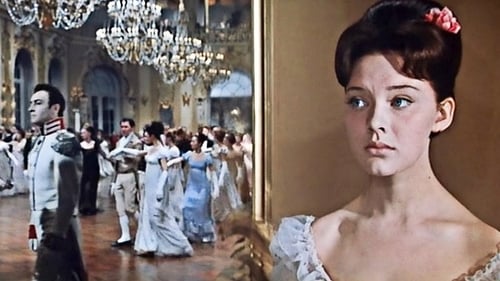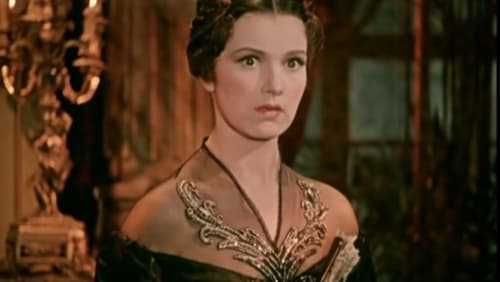
Drubetskaya
A fines de 1809, Natasha asiste a su primer baile. Andrei se enamora de ella y tiene la intención de casarse con ella, pero su padre exige que esperen. El príncipe viaja al extranjero y Natasha lo anhela desesperadamente. Pero luego conoce a Anatol Kuragin y se olvida de Andrei. En el último momento, se arrepiente y abandona sus planes de fugarse con Anatol. Bolkonsky se entera y declara que su compromiso ha terminado. Pierre, tratando de calmarla, de repente anuncia que la ama.

Drubetskaya
La primera película de una adaptación en cuatro partes de la novela de Leo Tolstoy de 1869. En San Petersburgo de 1805, Pierre Bezukhov, el hijo ilegítimo de un rico noble, es presentado a la alta sociedad. Su amigo, el príncipe Andrei Bolkonsky, se une al Ejército Imperial Ruso como ayudante de campo del general Mikhail Kutuzov en la Guerra de la Tercera Coalición contra Napoleón.

Drubetskaya
Campaña napoleónica de 1812. Rusia contempla el implacable avance de las tropas napoleónicas hacia sus fronteras. La idílica vida de los miembros de la alta sociedad (el príncipe Andréi Bolkonsky, el soñador e idealista Pierre Bezukhov o la joven Natacha Rostova) sufrirá un dramático cambio. Antes, los aristócratas, la gente corriente y los siervos vivían en mundos completamente diferentes. Ahora, la necesidad de defender la patria los ha convertido en compañeros de armas.

Semenikha
Based on the novel of the same name by Leonid Leonov. Young Polya comes to Moscow: she wants to find her father, Professor Vikhrov, and try to understand why her mother broke up with him. Vikhrov is a prominent scientist who has defended the forest from barbaric destruction all his life. The war begins. Professor Vikhrov continues to lecture, proving to students the need to protect the forest. Polya is trying to find out the reasons for the long-standing feud between her father and academician Gratsianskiy. Now, when Vikhrov is already not young and lonely, the professor mentally returns to the past...

Rodka Gulyaev is a pupil of the Gumniskii rural secondary school. He on the bank of the river digs out the darkened old icon, and his grandmother Avdotya, an overbearing and cunning old woman, dissolves a rumor that the icon is miraculous, and her granddaughter is a saint.

Anfisa
Pilot Losev, who lost his family during the war, learns that his daughter Aurika was saved during the bombing, and sets off in search of her. The former pilot will survive many fates and stories before a familiar chorus of a lullaby helps him to recognize his daughter in a random fellow traveler.

Nina Aleksandrovna Ivolgina
The film is based on the first part of the novel of the same name by Fyodor Dostoevsky.
Prince Myshkin returns to Russia from Switzerland, where he was treated in a psychiatric clinic. On the train, on the way to St.Petersburg, the prince meets Parfyon Rogozhin, who tells him of his passionate love for Nastasya Filippovna, the former containment woman of the millionaire Totsky. In St.Petersburg, the prince finds himself in the house of his distant relative – Lizaveta Yepanchina (General's wife), meets her husband, their daughters, as well as the Secretary of General – Ganya Ivolgin. The portrait of Nastasya Filippovna, accidentally seen on the general’s table, makes a great impression on the prince...

Luisa Karlovna Ivanova

Working with children led Barskaya to create superb direct sound and an inspired style of shooting. Don’t look for conventional cinematic syntax here. The film is chaotic in the way that Soviet films still knew how to be, and Langlois couldn’t help but be seduced by its rebellious spirit, its anarchy and love of children, comparable to Vigo’s Zero de conduite.
As well as being a film made with and for children, it offers a complex take on Western society. Pre-Nazi Germany is not named as such but is carefully reconstructed, possibly under advice from Karl Radek, and children offer a playful reflection of class struggle – doubly excluded, as proletarians and as minors. “They play in the same way that they live”, one intertitle says. The interaction between their comical games and the yet more ludicrous ones played by adults is developed on several levels.







